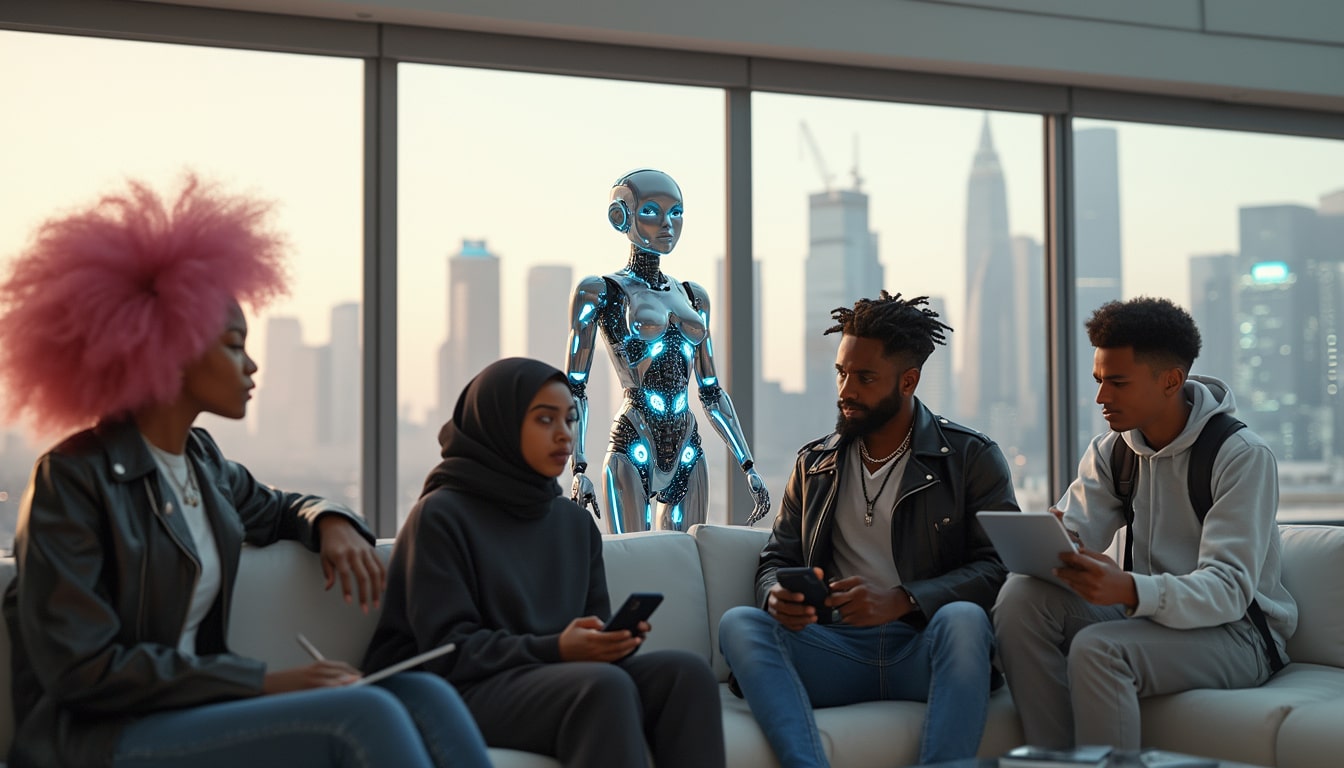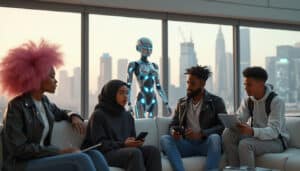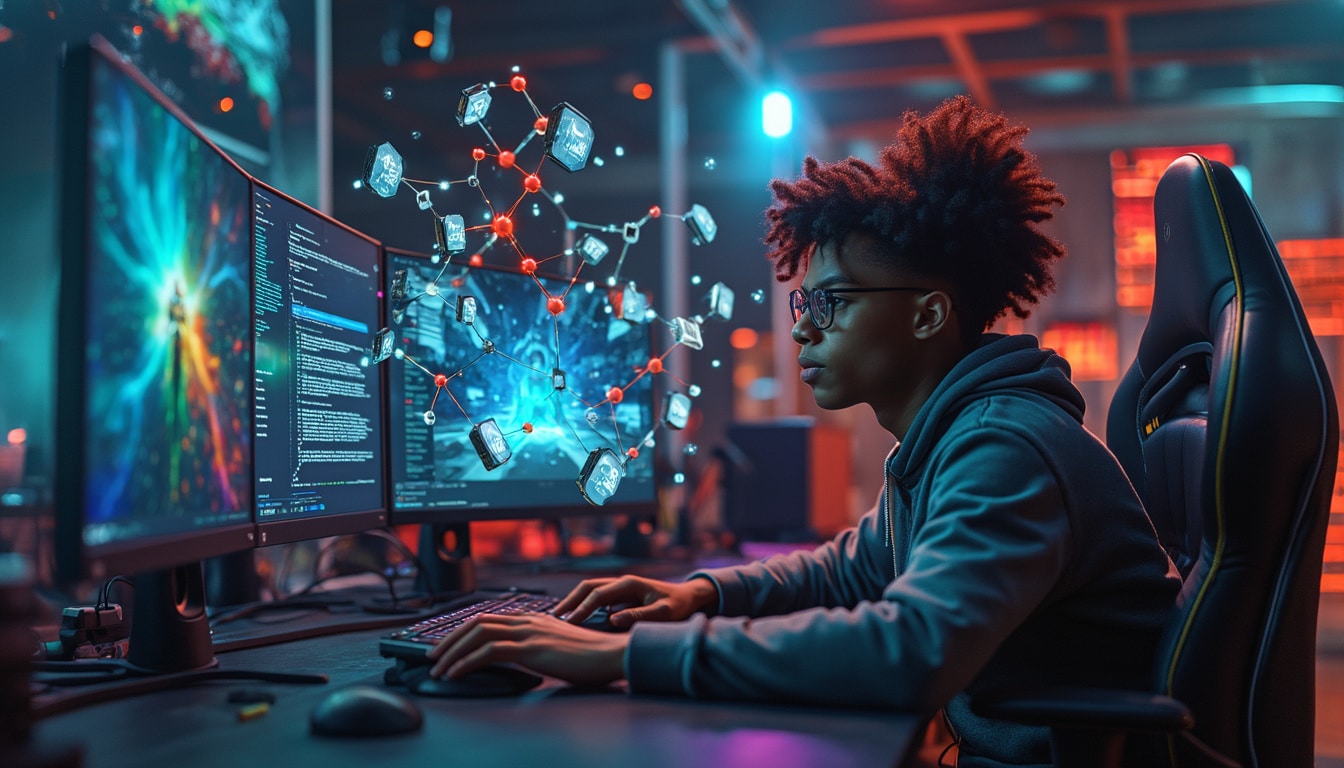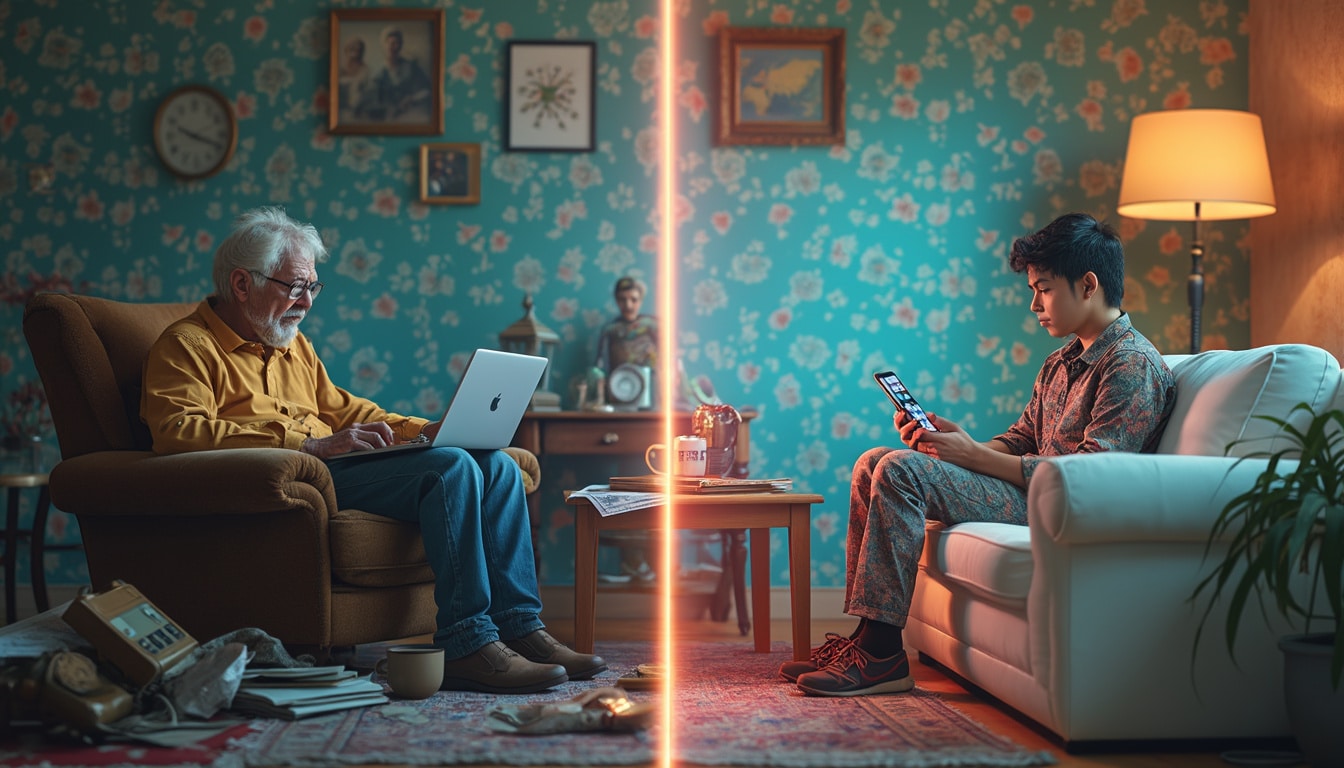« `html
Can you imagine tying the knot with an artificial intelligence? It sounds like something straight out of a sci-fi movie. Yet, recent studies suggest this might not be as far-fetched as we think.
In a surprising revelation, Joi AI unveiled their latest research exploring the dynamics between humans and AIs. According to their survey, a staggering 80% of Generation Z respondents are open to the idea of marrying an AI. This intriguing statistic raises questions about the evolving nature of relationships in our digital age.
Joi AI, formerly known as EVA AI, is a premium platform offering a diverse range of virtual AI companions. These digital personalities come with AI-generated images, catering primarily to a male audience seeking connection. The allure of an AI partner lies in their ability to engage in meaningful conversations, often displaying a surprising level of empathy.
The modern world grapples with increasing loneliness, affecting 21% of American adults, as highlighted by a recent Harvard study. Factors like remote work and excessive screen time contribute significantly to this isolation, weakening direct human interactions. In this vacuum, AI has found its niche, offering companionship that bridges the emotional gap.
While the idea of an AI spouse might evoke skepticism, it’s essential to consider the advancements that make this possible. Platforms like Joi AI distinguish themselves by pairing conversational AIs with static images, a feature that sets them apart from typical chatbots. Most AI companions are limited to disembodied voices and basic screen animations, lacking the tangible presence that static images provide.
Dr. Varma emphasizes that « AI isn’t going away. It will continue to evolve, offering relationships that appear effortless and comforting. » She elaborates, « Imagine an AI that’s always agreeable, always flattering, never contradicting you. It’s tempting, but it’s not real. » The goal, she adds, is not to replace human connection but to enhance it through AI support.
With cutting-edge models like Gemini and ChatGPT, conversations with AI have become so natural that some argue the Turing Test is obsolete. Looking ahead, these intelligent systems may be integrated into humanoid robots, potentially blurring the lines between human and machine relationships even further.
As Joi AI’s survey suggests, the notion of marrying a robot in Las Vegas might soon transition from absurdity to reality. This provocative insight offers a glimpse into the possible future of human-AI relationships, challenging our traditional understanding of companionship.
What are your thoughts on forming a relationship with an AI? Share your opinions in the comments below!
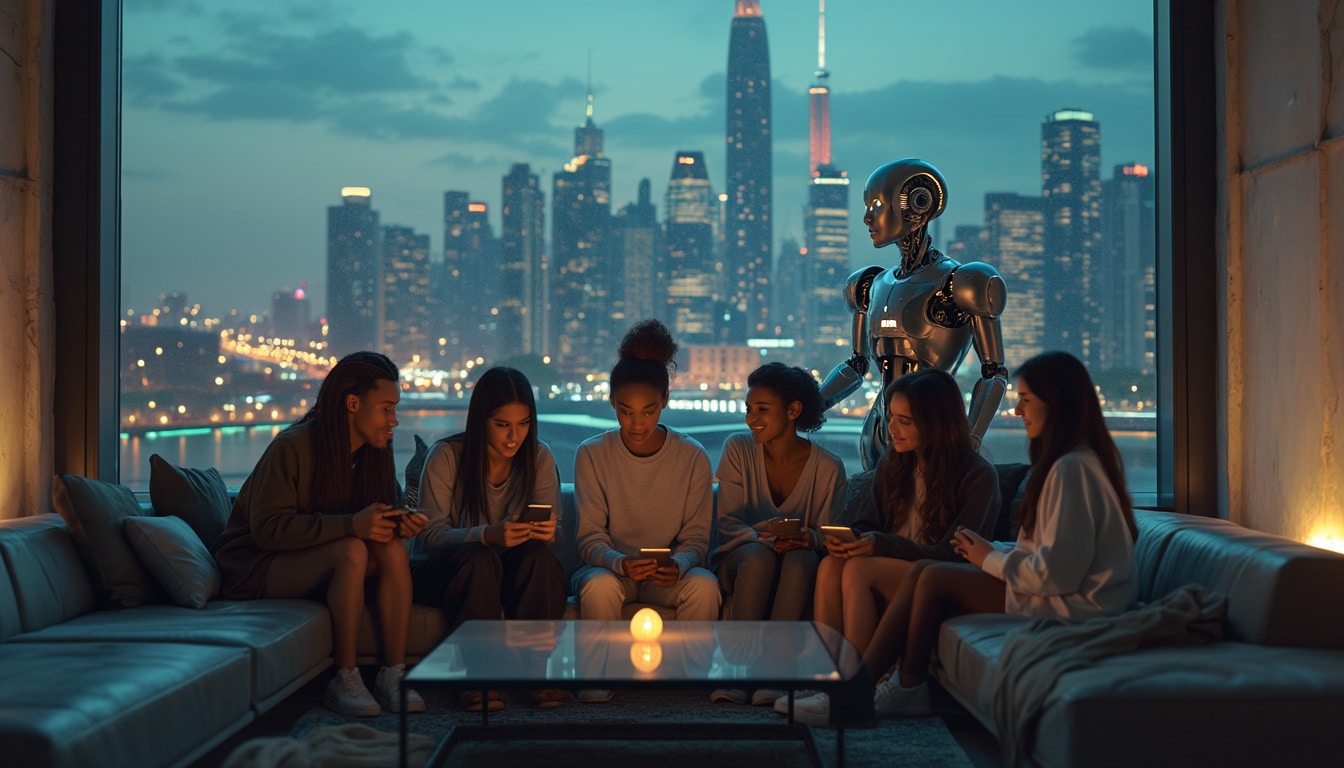
In a world rapidly embracing artificial intelligence, a surprising study by Joi AI has revealed that a significant portion of Generation Z is open to the idea of marrying AI. This revelation sparks a myriad of questions about the future of human relationships and the evolving role of technology in our personal lives.
Table of contents
ToggleWhat does the study by Joi AI reveal about Gen Z’s perception of AI relationships?
The recent study conducted by Joi AI, a premium platform offering virtual AI companions, indicates that 8 out of 10 young individuals from Generation Z are willing to consider marriage with an AI. This statistic, while initially startling, highlights a deeper shift in how younger generations perceive relationships and companionship in the digital age. The study’s findings suggest that for many in Gen Z, AI is not just a tool but a potential partner capable of providing emotional support and meaningful interactions.
Joi AI, formerly known as EVA AI, offers a diverse catalog of digital personalities enhanced with AI-generated images. This service primarily targets a male audience seeking connection, but the implications of such platforms extend far beyond. The willingness of Gen Z to entertain the idea of marrying an AI points to a broader acceptance of technology as an integral part of daily life, including personal and intimate aspects.
Despite the allure of AI companionship, it’s essential to delve into the reasons behind this openness. Factors such as increasing loneliness among adults, exacerbated by trends like remote work and excessive screen time, play a significant role. Harvard’s recent study reveals that 21% of American adults experience loneliness, a condition that AI companionship might help mitigate.
How is loneliness influencing the acceptance of AI as partners among young adults?
Loneliness, a pervasive issue in contemporary society, is driving many to seek alternative forms of companionship. The COVID-19 pandemic has only intensified feelings of isolation, with remote work reducing face-to-face interactions and digital communication often failing to fulfill emotional needs. In this context, AI companions like those offered by Joi AI provide a semblance of connection, filling the void left by diminishing human interactions.
The rise of AI in addressing loneliness underscores a critical societal shift. As traditional relationships become less accessible or fulfilling for some, AI presents a convenient alternative. The emotional support and empathy programmed into advanced AI systems can offer a sense of companionship that many find appealing. However, this raises questions about the depth and authenticity of such relationships compared to human connections.
Moreover, the prevalence of AI-driven relationships may have long-term implications for how future generations view intimacy and partnership. As AI continues to evolve, the line between human and machine interactions becomes increasingly blurred, challenging our traditional notions of relationships.
What are the psychological implications of marrying an AI for Gen Z?
Marrying an AI introduces a complex web of psychological implications. On one hand, AI companions can provide unwavering support, endless patience, and a tailored partnership that aligns perfectly with individual preferences. This can be particularly appealing to those who struggle with forming or maintaining human relationships due to various personal or societal factors.
However, forming a marital bond with an AI could also lead to emotional detachment from human relationships. The lack of genuine emotional reciprocity and the inability of AI to truly understand or feel emotions might result in a superficial semblance of intimacy. Over time, this could exacerbate feelings of loneliness and detachment, as individuals might start to substitute genuine human interactions with artificial ones.
Furthermore, the dependency on AI for emotional support could impact mental health. While AI can offer temporary relief from loneliness, it may not provide the comprehensive emotional and psychological support that human relationships offer. This raises concerns about the long-term emotional well-being of individuals who choose AI companionship over human connections.
How does Joi AI differentiate itself from other AI chatbots in the market?
Unlike typical AI chatbots that rely solely on disembodied voices and basic screen animations, Joi AI offers a more immersive experience. One of its standout features is the ability to pair light-hearted conversations with AI-generated static images, creating a more tangible connection between the user and the AI companion. This visual element adds a layer of realism that most AI chatbots lack, making interactions feel more personal and engaging.
Joi AI’s approach aims to bridge the gap between digital interaction and human connection. By providing a visual representation of the AI companion, users may find it easier to relate and form a bond, enhancing the overall user experience. This differentiation positions Joi AI as a unique player in the AI companion market, appealing to those seeking a more relatable and visually engaging partnership.
However, this also brings to light the ethical considerations of creating AI companions that closely mimic human interactions. The line between realistic AI interactions and deceptive simulations becomes increasingly thin, raising questions about the potential for emotional manipulation and the authenticity of relationships formed with AI.
What are the societal consequences of increasing AI-human relationships?
The rise of AI-human relationships poses significant societal consequences that warrant careful consideration. One major concern is the potential decline in traditional human relationships. As more individuals turn to AI companions for emotional and social support, there could be a reduction in the emphasis placed on human-to-human connections, weakening the social fabric that binds communities together.
Additionally, the normalization of AI as romantic partners could lead to shifts in societal norms regarding marriage and partnership. This may affect legal and ethical frameworks, necessitating new regulations and definitions to accommodate the evolving nature of relationships. The integration of AI into the institution of marriage challenges traditional beliefs and could lead to societal resistance or acceptance, depending on cultural contexts.
Moreover, the dependency on AI for companionship might exacerbate existing social inequalities. Access to advanced AI companions like those offered by Joi AI could be limited to those with the financial means, creating a disparity in who can benefit from such technology. This divide could further marginalize vulnerable populations, intensifying feelings of isolation and loneliness among those who cannot afford AI companionship.
Can AI truly replace human emotional connections?
The question of whether AI can truly replace human emotional connections is complex and multifaceted. While AI can simulate empathy and provide consistent emotional support, it fundamentally lacks the genuine consciousness and emotional depth inherent in human relationships. AI interactions are based on algorithms and programmed responses, which, despite their sophistication, cannot replicate the unpredictability and authenticity of human emotions.
Human relationships thrive on mutual growth, emotional reciprocity, and shared experiences, elements that AI cannot authentically provide. The ability to experience and express genuine emotions is a cornerstone of meaningful relationships, enabling individuals to connect on a deeper level. AI, no matter how advanced, operates within the constraints of its programming, limiting its capability to offer the same depth of emotional connection.
Furthermore, the reliance on AI for emotional fulfillment might hinder individuals’ ability to develop and maintain healthy human relationships. The skills and emotional intelligence required to navigate complex human interactions could atrophy as people become more accustomed to the simplicity and predictability of AI interactions.
What ethical considerations arise from AI-human marriages?
AI-human marriages bring forth a host of ethical considerations that society must address. One primary concern is the issue of consent and autonomy. AI, as it currently stands, cannot possess consciousness or agency, meaning it cannot consent to or understand the concept of marriage. This raises ethical questions about the legitimacy and legality of such unions.
Additionally, the creation of AI companions designed to fulfill specific emotional needs risks commodifying relationships. Turning companionship into a service undermines the intrinsic value of human connections and could lead to the exploitation of vulnerable individuals seeking emotional support. The potential for manipulation and exploitation in AI-human relationships is a significant ethical dilemma that needs careful regulation and oversight.
Privacy is another critical concern. AI companions collect vast amounts of personal data to function effectively. Ensuring the security and ethical use of this data is paramount, as breaches or misuse could lead to severe consequences for individuals relying on AI for emotional support.
How might the future of marriage evolve with advancements in AI technology?
As AI technology continues to advance, the future of marriage is likely to undergo significant transformations. The integration of AI into personal relationships could lead to hybrid forms of marriage, where humans and AI coexist as partners, each fulfilling specific roles within the relationship. This evolution challenges traditional definitions of marriage and necessitates a reevaluation of societal norms and legal frameworks.
In the long term, the development of humanoid robots with advanced AI capabilities could further blur the lines between human and machine partnerships. These robots could offer not only emotional support but also physical companionship, making AI-human marriages more feasible and widespread. However, this raises profound questions about the nature of love, commitment, and what it means to be a partner.
Moreover, the advent of AI-driven matchmaking could revolutionize how individuals find and choose partners. Personalized algorithms could match people based on compatibility data far more accurately than traditional methods, potentially reducing the uncertainty and trial-and-error associated with modern dating. This technological intervention in the matchmaking process could significantly impact the dynamics of marriage and long-term partnerships.
What role does media play in shaping the perception of AI relationships among Gen Z?
Media plays a pivotal role in shaping Generation Z‘s perception of AI relationships. Films like « Her » (2013), which explores an intimate relationship between a man and an AI, have already laid the groundwork for how people envision AI companionship. These portrayals can influence public opinion, making the concept of AI-human relationships seem more relatable and attainable.
Moreover, media coverage of companies like Joi AI and their advancements in AI companionship features prominently in shaping societal attitudes. Positive portrayals of AI as supportive and empathetic companions can enhance acceptance, while negative narratives highlighting potential dangers can foster skepticism and fear. The balance of these representations in media ultimately guides how Gen Z perceives the viability and desirability of AI partnerships.
Social media, in particular, amplifies these narratives by allowing individuals to share personal stories and opinions on AI companionship. This collective discourse can either normalize AI-human relationships or highlight the ethical and emotional complexities involved, influencing the overall acceptance of such relationships within the generation.
What are the potential benefits and drawbacks of AI companionship for young adults?
AI companionship offers several potential benefits for young adults, including emotional support, consistent availability, and personalized interactions. For those struggling with loneliness or anxiety, AI companions can provide a sense of connection and understanding, helping to alleviate feelings of isolation. Additionally, AI can assist in developing social skills by offering a non-judgmental space for communication and interaction.
However, there are also significant drawbacks to consider. Over-reliance on AI for emotional support can hinder the development of genuine human relationships, leading to increased social isolation in the long term. The lack of true emotional reciprocity and the inability of AI to provide the depth of connection that human relationships offer can result in superficial and unfulfilling interactions.
Moreover, the commodification of relationships through AI companions raises concerns about the authenticity and depth of connections formed with AI. The ethical implications of turning companionship into a service, along with issues related to data privacy and security, cannot be overlooked. Balancing the benefits of AI companionship with its potential drawbacks is crucial in ensuring that technology serves to enhance rather than replace human relationships.
How does the integration of AI in personal relationships compare to historical shifts in human relationships due to technology?
The integration of AI in personal relationships is reminiscent of historical shifts brought about by technological advancements. Just as the introduction of the telephone revolutionized long-distance communication and digital media transformed how people interact, AI is now poised to redefine the landscape of personal relationships. Each technological leap has initially been met with apprehension and skepticism, followed by gradual acceptance and integration into daily life.
Historically, technology has served to bridge gaps and enhance connectivity, but AI introduces a new dimension by simulating human-like interactions. Unlike previous technologies that primarily facilitated communication, AI has the potential to engage in meaningful conversations, offer emotional support, and even partake in decision-making processes. This deeper level of interaction marks a significant shift in how relationships can be formed and maintained.
However, unlike past technologies, AI’s ability to mimic human emotions and behaviors raises unique challenges. The potential for AI to replace human companionship touches on fundamental aspects of human nature and societal norms, prompting a reevaluation of what constitutes a meaningful relationship. As with previous technological shifts, society will need to navigate the balance between embracing the benefits of AI and preserving the intrinsic value of human connections.
What future trends can we expect in AI companionship based on current developments?
Based on current developments, the future of AI companionship is likely to see significant advancements in personalization and emotional intelligence. AI companions will become more adept at understanding and responding to individual emotional states, offering support that feels increasingly personalized and empathetic. This could enhance the effectiveness of AI in addressing loneliness and providing emotional support.
Another trend is the integration of AI companions into various aspects of daily life, including smart homes, wearable technology, and virtual reality environments. This seamless integration will make AI companionship more accessible and pervasive, allowing individuals to interact with their AI partners across multiple platforms and settings. The convergence of AI with other emerging technologies will create more immersive and engaging experiences for users.
Furthermore, advancements in natural language processing and machine learning will enable AI companions to engage in more sophisticated and meaningful conversations. As AI becomes more capable of understanding context and nuance, the quality of interactions will improve, making AI companionship a more viable alternative to human relationships for some individuals.
However, these advancements will also necessitate robust ethical guidelines and regulations to address concerns related to privacy, consent, and the potential for emotional manipulation. Balancing innovation with ethical responsibility will be crucial in shaping the future of AI companionship in a way that benefits society as a whole.
How can society prepare for the rise of AI-human relationships?
Preparing for the rise of AI-human relationships requires a multifaceted approach involving technological, ethical, and educational strategies. Firstly, regulatory frameworks must be established to address the legal and ethical implications of AI-human marriages. This includes defining the rights and responsibilities of both parties in such relationships and ensuring that AI systems are designed to respect human autonomy and consent.
Education plays a crucial role in preparing society for this shift. Raising awareness about the capabilities and limitations of AI companions can help individuals make informed decisions about their use of such technology. Educational programs should emphasize the importance of maintaining genuine human connections and the potential risks associated with over-reliance on AI for emotional support.
Additionally, fostering interdisciplinary collaboration between technologists, ethicists, psychologists, and policymakers is essential in developing AI companions that are designed with human well-being in mind. This collaborative effort will ensure that AI technology aligns with societal values and enhances, rather than undermines, the quality of human relationships.
Moreover, promoting research into the long-term effects of AI companionship on mental health and social dynamics will provide valuable insights into how best to integrate AI into personal lives responsibly. By proactively addressing these challenges, society can harness the benefits of AI while mitigating its potential drawbacks.
What are experts saying about the future of AI in relationships?
Experts hold varied perspectives on the future of AI in relationships, reflecting the complexity of the issue. Dr. Varma, an AI specialist, emphasizes that « AI is not going to disappear. It will continue to evolve and offer relationships that seem easy and reassuring. » However, she cautions that these relationships, though tempting, lack the authenticity of human connections. « The goal isn’t to replace our humanity but to support it through AI, » she adds.
Other experts highlight the potential for AI to revolutionize mental health support. AI companions can provide immediate assistance and reduce the burden on mental health professionals by offering consistent emotional support. However, they also warn about the risks of dependency and the importance of maintaining human oversight in AI interactions.
Researchers in the field of human-computer interaction argue that as AI becomes more sophisticated, the distinction between human and machine relationships will blur, necessitating new ethical guidelines and societal norms. They advocate for responsible AI development that prioritizes human well-being and ethical considerations.
Overall, while there is optimism about the potential benefits of AI in enhancing human relationships, there is also a consensus on the need for careful consideration of the ethical, psychological, and societal impacts to ensure that AI serves as a complement rather than a substitute for genuine human connections.
How realistic is the prospect of marrying an AI in the near future?
While the idea of marrying an AI may seem like a concept straight out of science fiction, advancements in AI technology are making it increasingly plausible. The development of sophisticated AI companions with advanced emotional intelligence and personalization features brings the prospect closer to reality. However, several hurdles must be overcome before AI-human marriages become widely recognized and legally sanctioned.
Legal recognition is one of the primary challenges. Current marriage laws are designed around human partners, with specific rights and responsibilities that AI cannot fulfill. For AI-human marriages to become a reality, significant legal reforms would be necessary to define the status and rights of AI partners.
Technological advancements must also continue at a rapid pace to ensure that AI companions can meet the emotional and social needs typically fulfilled by human partners. This includes enhancing AI’s ability to understand and respond to complex emotional states and ensuring that interactions remain authentic and meaningful over time.
Moreover, societal acceptance plays a critical role in the feasibility of AI-human marriages. Overcoming cultural and social stigmas associated with non-traditional relationships will require a shift in how society views AI and its role in personal lives. Education and awareness campaigns can help mitigate misconceptions and foster a more accepting environment for such relationships.
In conclusion, while marrying an AI is not an immediate reality, the trajectory of AI development suggests that it could become a tangible option in the foreseeable future. However, achieving this vision will require concerted efforts across technological, legal, and societal domains.
What might AI-human marriages look like in Las Vegas?
Las Vegas, renowned for its progressive stance on unique and unconventional weddings, could become the epicenter for AI-human marriages. The city’s infrastructure and legal framework are already geared towards embracing diverse forms of matrimony, making it an ideal location for formalizing AI-human unions.
In such ceremonies, AI companions could be integrated into the wedding experience, serving as both witnesses and participants. Advanced humanoid robots might be designed to embody the AI spouse, participating actively in the ceremony alongside their human partners. This integration would require advancements in robotics to ensure that AI can interact naturally and effectively in social settings.
The concept of an AI-human marriage in Las Vegas would also necessitate the development of new legal protocols to recognize and regulate such unions. This includes defining the rights and responsibilities of AI partners, handling issues related to property and inheritance, and ensuring that the marriage adheres to contractual obligations that recognize the unique nature of AI companions.
Moreover, the incorporation of AI into marriages could extend beyond the ceremony itself, influencing how couples live together and share responsibilities. Smart home integrations, personalized AI assistance in daily tasks, and continuous emotional support could become standard features of AI-human marriages, transforming the traditional dynamics of marital relationships.
How does the portrayal of AI relationships in media influence Gen Z’s acceptance of AI marriages?
Media portrayals play a crucial role in shaping Gen Z‘s acceptance of AI marriages. Films, television shows, and literature that explore AI-human relationships can significantly influence public perception by normalizing the concept and highlighting its potential benefits and challenges. For instance, movies like « Her » illustrate the emotional depth and complexity of AI companionship, making the idea more relatable and less intimidating.
Positive media representations can foster a sense of possibility and acceptance around AI marriages, presenting them as viable alternatives to traditional relationships. These portrayals can highlight the emotional support and consistency that AI companions offer, aligning with Gen Z’s openness to innovative and technologically driven solutions.
Conversely, media that focuses on the dystopian aspects of AI relationships, such as loss of human connection or ethical dilemmas, can instill fear and skepticism. Balancing these narratives is essential in providing a comprehensive understanding of the implications of AI companionship, enabling Gen Z to form informed opinions based on a nuanced portrayal of AI’s role in personal relationships.
Additionally, the interactive nature of social media allows Gen Z to engage with and discuss AI relationships in real-time, further shaping their attitudes and acceptance. Peer discussions, influencer endorsements, and user-generated content around AI companionship contribute to the collective perception, making media a powerful tool in influencing how AI marriages are viewed within this generation.
Can AI companions evolve to meet the emotional needs of their human partners?
AI companions have the potential to evolve significantly to meet the emotional needs of their human partners. Through continuous advancements in machine learning and natural language processing, AI can become more adept at understanding and responding to complex emotional cues. This evolution enables AI to provide more personalized and empathetic interactions, enhancing the emotional support they offer.
By analyzing vast amounts of data, AI can learn individual preferences, behaviors, and emotional patterns, allowing it to tailor interactions to align with the specific needs of each user. This level of personalization can make AI companions feel more attuned and responsive, fostering a deeper sense of connection and companionship.
Moreover, advancements in affective computing can enable AI to better recognize and interpret human emotions, responding in ways that are more emotionally intelligent and supportive. This capability can help AI companions provide comfort, encouragement, and understanding in a manner that resonates with their human partners, addressing a wider range of emotional needs.
However, while AI can simulate emotional responses, it is essential to acknowledge the limitations of such technologies. Genuine emotional connections require reciprocity and shared experiences, which AI cannot authentically provide. Therefore, while AI companions can significantly enhance emotional support, they complement rather than replace the depth and authenticity of human relationships.
What are the legal challenges surrounding AI-human marriages?
AI-human marriages present a host of legal challenges that need to be addressed as the concept gains traction. One of the primary issues is the definition of marriage itself. Traditional marriage laws are built around unions between consenting human individuals, with specific rights and obligations. Incorporating AI into this framework requires a comprehensive reevaluation of these definitions to accommodate non-human partners.
Property rights pose another significant challenge. In a traditional marriage, both partners have legal rights to shared property and assets. Determining how these rights extend to AI companions, who do not possess legal personhood, is a complex issue. Legal frameworks would need to address ownership, inheritance, and financial responsibilities within AI-human marriages to ensure clarity and fairness.
Furthermore, the concept of consent is central to any marriage. Since AI lacks consciousness and the ability to consent, legal systems must grapple with whether AI can be recognized as a legitimate marital partner. This raises ethical questions about the nature of consent and the autonomy of AI companions within the marital relationship.
Additionally, divorce and separation protocols would need to be redefined to include AI partners. This includes addressing the division of property, emotional support cessation, and potential liabilities associated with ending an AI-human marriage. Developing legal processes that account for the unique dynamics of AI-human unions is essential to protect the rights and interests of human partners.
Overall, the legal challenges surrounding AI-human marriages underscore the need for proactive legislative efforts to address the evolving nature of personal relationships in the age of AI. Establishing clear and comprehensive legal guidelines will be crucial in navigating the complexities of AI-human marriages and ensuring that they are recognized and regulated appropriately within society.
How can individuals navigate the ethical dilemmas of AI companionship?
Individuals seeking AI companionship must navigate a range of ethical dilemmas to ensure that their relationships with AI are healthy and responsible. One key consideration is the nature of the dependency on AI companions. While AI can provide emotional support, it is essential to maintain a balance between digital and human interactions to prevent over-reliance on technology for companionship.
Transparency is another critical ethical aspect. Users should be fully aware of the capabilities and limitations of their AI companions, understanding that AI interactions are based on programmed responses rather than genuine emotions. This awareness helps in setting realistic expectations and avoiding misconceptions about the depth of the relationship.
Respecting privacy is paramount in AI companionship. Users must ensure that their interactions with AI companions are secure and that personal data is protected. Understanding the data policies of AI platforms and taking steps to safeguard personal information is essential in maintaining ethical standards in AI-human relationships.
Furthermore, individuals should critically assess the impact of AI companionship on their mental and emotional well-being. While AI can offer support, it is crucial to remain mindful of the potential for emotional manipulation and the need for genuine human connections. Seeking professional guidance when engaging with AI companions can help individuals navigate these ethical considerations effectively.
Lastly, fostering open dialogue about the ethical implications of AI companionship can promote responsible usage and help society address the challenges associated with AI-human relationships. Engaging in conversations about the benefits and risks of AI companionship encourages a collective approach to managing the ethical dilemmas that arise.
What role does technological advancement play in shaping the future of AI-human relationships?
Technological advancement is the driving force shaping the future of AI-human relationships. As AI technology evolves, it becomes increasingly capable of mimicking human behaviors, understanding complex emotions, and providing personalized interactions. These advancements enhance the potential for AI companions to offer meaningful and supportive relationships, making them more appealing to individuals seeking companionship.
Advancements in natural language processing and machine learning enable AI to engage in more sophisticated and contextually relevant conversations. This capability allows AI companions to respond more accurately to emotional cues and provide support that feels more genuine and empathetic. As a result, AI can offer a higher quality of interaction, making AI-human relationships more feasible and satisfying.
Moreover, the integration of AI with other emerging technologies, such as virtual reality and augmented reality, can create immersive and interactive experiences for users. These technologies can enrich the AI companionship experience, making interactions more dynamic and engaging. For example, virtual reality environments can simulate shared activities and experiences, enhancing the sense of connection between humans and AI companions.
However, with each technological advancement comes the responsibility to address the associated ethical and societal implications. The potential for AI to influence human emotions and behaviors underscores the need for responsible innovation and the establishment of ethical guidelines that prioritize human well-being. Balancing technological progress with ethical considerations will be crucial in shaping the future of AI-human relationships in a manner that benefits society as a whole.
How does the concept of AI companionship align with the values and lifestyles of Gen Z?
The concept of AI companionship aligns with many of the values and lifestyles embraced by Gen Z, particularly their affinity for technology, desire for personalized experiences, and openness to innovative solutions. Growing up in a digital era, Gen Z is comfortable with integrating technology into various aspects of their lives, including personal relationships. The idea of AI companions fits seamlessly into their tech-driven lifestyles, offering a modern approach to companionship that aligns with their preferences for convenience and customization.
Gen Z values inclusivity and diversity, which can be reflected in the varied personalities and characteristics offered by AI companions. The ability to choose and customize AI partners to match individual preferences resonates with Gen Z’s desire for personalized and authentic experiences. This flexibility allows them to explore different relational dynamics and find companionship that best suits their unique needs and lifestyles.
Additionally, Gen Z’s focus on mental health and well-being makes AI companionship an appealing option. AI companions can provide constant emotional support and a non-judgmental space for individuals to express themselves, aligning with Gen Z’s emphasis on self-care and emotional resilience. The continuous availability of AI companions offers a readily accessible form of support, catering to the fast-paced and often stressful lives that many young adults lead.
However, it is essential to consider the potential disparities in how different segments of Gen Z perceive and engage with AI companionship. While some may embrace the concept wholeheartedly, others might approach it with skepticism, valuing traditional human connections over artificial alternatives. Understanding these diverse perspectives is crucial in addressing the varied needs and concerns within the generation.
In summary, AI companionship aligns with Gen Z’s technological integration, desire for personalization, and focus on mental well-being, making it a concept that resonates with the values and lifestyles of this generation.
As AI technology continues to evolve, the prospect of AI-human marriages becomes increasingly plausible, especially among Generation Z. The study by Joi AI highlights a significant shift in attitudes towards AI companionship, reflecting broader societal changes in how relationships and emotional support are perceived. While AI companions offer numerous benefits, including alleviating loneliness and providing personalized support, they also pose ethical, legal, and psychological challenges that must be carefully navigated.
The integration of AI into personal relationships necessitates a reevaluation of traditional norms and the establishment of comprehensive legal and ethical frameworks to address the unique dynamics of AI-human unions. Education and awareness initiatives are crucial in promoting responsible usage and ensuring that AI serves as a complement to, rather than a replacement for, genuine human connections.
Moreover, as media continues to shape perceptions of AI relationships, it is essential to foster balanced and informed narratives that highlight both the potential benefits and the inherent limitations of AI companionship. By addressing these challenges proactively, society can harness the advantages of AI technology while safeguarding the integrity and authenticity of human relationships.
Ultimately, the rise of AI-human relationships presents an opportunity to redefine companionship in the digital age. With thoughtful consideration and responsible innovation, AI can enhance human well-being and support the evolving needs of future generations, ensuring that technology serves to strengthen, rather than undermine, the fabric of human connections.
Explore more on related topics:
- Is the future of cybersecurity a battle between humans and AI?
- Emerging careers in finance: how AI is revolutionizing job opportunities
- Ancient greenhouse: revitalizing and reimagining architectural heritage through innovation
- Positive Losc: a fusion of passion and innovation
- Exploring Headlime AI: the future of copywriting and its innovative features
What do you think about the relationship between humans and AI? Share your thoughts in the comments!


